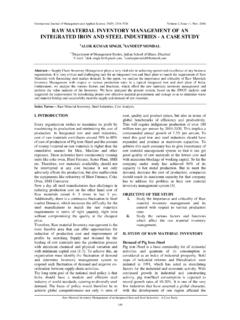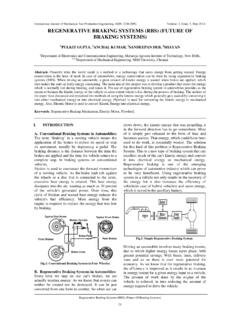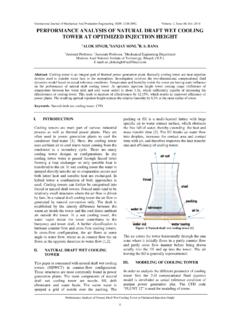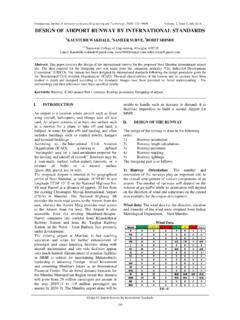Transcription of ROLE OF COMMERCIAL BANKS IN THE ECONOMIC …
1 Role of COMMERCIAL BANKS in the ECONOMIC Development of INDIA 1 ROLE OF COMMERCIAL BANKS IN THE ECONOMIC DEVELOPMENT OF INDIA 1 BANDLAMUDI KALPANA, 2 TAIDALA VASANTAHA RAO 1 RESEARCH SCHOLAR, DEPARTMENT OF COMMERCE AND BUSINESS ADMINASTRAION, ACHARYA NAGARJUNA UNIVERSITY, GUNTUR, AP E-mail: Abstract - BANKS have always played an important position in the country s economy. They play a decisive role in the development of the industry and trade. They are acting not only as the custodian of the wealth of the country but also as resources of the country, which are necessary for the ECONOMIC development of a nation. The general role of COMMERCIAL BANKS is to provide financial services to general public and business, ensuring ECONOMIC and social stability and sustainable growth of the economy. COMMERCIAL Bank in India comprises the State Bank of India (SBI) and its subsidiaries , nationalized BANKS , foreign BANKS and other scheduled COMMERCIAL BANKS , regional rural BANKS and non-scheduled COMMERCIAL BANKS .
2 The total numbers of branches of COMMERCIAL BANKS are more than 50,000 and the regional rural BANKS are approximately 8,000 covering 280 districts in the country. COMMERCIAL BANKS mostly provide short term loans and in some cases medium term financial assistance also to small scale units. Most of the COMMERCIAL BANKS have got specialized units in their administrative structure to take care of the financial needs of the small scale industrial units. As we know that the Agriculture is the backbone of economy of any country like India. Research is based upon the secondary data. Which provide the findings on COMMERCIAL BANKS and how it helpful in ECONOMIC development. The main objective of the study is to critically examine and analyze the role of COMMERCIAL BANKS on ECONOMIC growth in India. The study portrays how loans and credit affect the GDP and consequently the level of ECONOMIC growth of India. Keywords - social stability, rapid, realized, tax, GDP.
3 I. INTRODUCTION Activities of the COMMERCIAL BANKS in India are expanding at a rapid space during the period after Independence. There is territorial as well as functional. Expansion of the activities of the bank. BANKS which are conservative and conventional in their approach have come out from their shell and face the challenges of planned ECONOMIC growth. In recent years non-conventional sectors are receiving the attention of COMMERCIAL BANKS in India. A better understanding of the implications of financing non-conventional sector by COMMERCIAL BANKS is possible only if one looks back the position of COMMERCIAL BANKS during the pre-nationalization era. Banking in India before nationalization. COMMERCIAL BANKS are is the institutions that ordinarily accept deposits from the people and advances loans. COMMERCIAL BANKS also create in India; such BANKS alone are called COMMERCIAL BANKS which have been established in accordance with the provisions of the Banking Regulation Act, 1949.
4 COMMERCIAL BANKS may be Scheduled BANKS of Non-Scheduled BANKS . Banking Regulation Act, (BR Act), 1949. According to Section 5(c) of the BR Act, 'a banking company is a company which transacts the business of banking in India. According to Reserve BANKS of India Act 1934, A Scheduled Bank is that bank which has been included in the second schedule of the Reserve Bank . II. CLASSIFICATION OF COMMERCIAL BANKS 1. Scheduled BANKS : - BANKS which have been included in the Second Schedule of RBI Act 1934. They are categorized as follows: 2. Public Sector BANKS : - are those BANKS in which majority of stake are held by the government. Eg. SBI, PNB, Syndicate Bank, Union Bank of India etc. 3. Private Sector BANKS : - are those BANKS in which majority of stake are held by private individuals. Eg. ICICI Bank, IDBI Bank, HDFC Bank, AXIS Bank etc. 4. Foreign BANKS : - are the BANKS with Head office outside the country in which they are located.
5 Eg. Citi Bank, Standard Chartered Bank, Bank of Tokyo Ltd. etc. 5. None scheduled COMMERCIAL BANKS : - BANKS which are not included in the Second Schedule of RBI Act 1934. III. THE OBJECTIVES OF THE STUDY (a) The central objective of the study is to empirically investigate the role of Indian BANKS in Capital formation and ECONOMIC growth. (b) To analyze the impact of BANKS deposit mobilization on capital formation and ECONOMIC growth in India (c) To determine the association existing between capital formation and ECONOMIC growth in India. International Journal of Management and Applied Science, ISSN: 2394-7926 Volume-3, Issue-4, Role of COMMERCIAL BANKS in the ECONOMIC Development of INDIA 2 IV. IMPORTANCE OF BANKS IN THE DEVELOPMENT OF THE COUNTRY BANKS are one of the most important parts of any country. In this modern time money and its necessity is very important.
6 A developed financial system of the country ensures to attain development. A modern bank provides valuable services to a country. To attain development there should be a good developed financial system to support not only the ECONOMIC but also the society. So, a modern bank plays a vital role in the socio ECONOMIC matters of the country. Some of the important role of BANKS in the development of a country is briefly showing below. PROMOTE SAVING HABITS OF THE PEOPLE: Bank attracts depositors by introducing attractive deposit schemes and providing rewards or return in the form of interest. BANKS providing different kinds of deposit schemes to its customers. It enable to create banking habits or saving habits among people. CAPITAL FORMATION AND PROMOTE INDUSTRY: Capital is one of the most important parts of any business or industry. It is the life blood of business. BANKS are increase capital formation by collecting deposits from depositors and convert these deposits in to loans advances to industries.
7 SMOOTHING OF TRADE AND COMMERCE FUNCTIONS: In this modern era trade and commerce plays vital role between any countries. So, the money transaction should be user friendly. A modern bank helps its customers to sent funds to anywhere and receive funds from anywhere of the world. A well developed banking system provides various attractive services like mobile banking, internet banking, debit cards, credit cards etc. these kinds of services fast and smooth the transactions. So, bank helps to develop trade and commerce GENERATE EMPLOYMENT OPPORTUNITY: Since a bank promote industry and investment, there automatically generate employment opportunity. So, a bank enables an economy to generate employment opportunity. SUPPORT AGRICULTURAL DEVELOPMENT: Agricultural sector is one of the integral part of any economy. Food self sufficiency is the major challenge and goal of any country. Modern bank promote agricultural sector by providing loans and advances with low rate of interest compared to other loans and advances schemes.
8 APPLYING OF MONITORY POLICY: Monitory policy is a important policy of any government. The major aim of monitory policy is to stabilize financial system of the country from the dangerous of inflation, deflation, crisis etc. BALANCED DEVELOPMENT: Modern BANKS spreading its operations throughout the world. we can see number of big BANKS like citi bank, Baroda bank etc. It helps a country to spread banking activities in rural and semi urban areas. With the spreading of banking operations around the country, helps to attain balanced development by promoting rural areas. Modern bank plays vital role in the socio- ECONOMIC development of the country. A developed banking system enables the country to attain balanced development without any special consideration of rich and poor, cities and rural areas etc. V. FUNCTIONS OF COMMERCIAL BANKS The COMMERCIAL BANKS serve as the king pin of the financial system of the country.
9 They render many valuable services. COMMERCIAL BANKS provide banking services to businesses and consumers through a network of branches . These BANKS are in business to make a profit for their owners and they are usually public limited companies managed by shareholders. In India, however, most of the top COMMERCIAL BANKS are owned by the government. But many private COMMERCIAL BANKS have been established in the recent years. COMMERCIAL BANKS are all-purpose BANKS that perform a wider range of functions such as accepting demand deposits, issuing cheques against saving and fixed deposits, making short-term business and consumer loans, providing brokerage services, buying and selling foreign exchange and so on. The functions of COMMERCIAL BANKS are explained below: Primary functions Collection of deposits Making loans and advances Collection of deposits: The primary function of COMMERCIAL BANKS is to collect deposits from the public.
10 Such deposits are of three main types: current, saving and fixed. current account is used to make payments. A customer can deposit and withdraw money from the current account subject to a minimum required balance. If the customer overdraws the account, he may be required to pay interest to the bank. Cash credit facility is allowed in the current account. International Journal of Management and Applied Science, ISSN: 2394-7926 Volume-3, Issue-4, Role of COMMERCIAL BANKS in the ECONOMIC Development of INDIA 3 Savings account is an interest yielding account. Deposits in savings account are used for saving money. Savings bank account-holder is required to maintain a minimum balance in his account to avail of cheque facilities. Fixed or term deposits are used by the customers to save money for a specific period of time, ranging from 7 days to 3 years or more.














